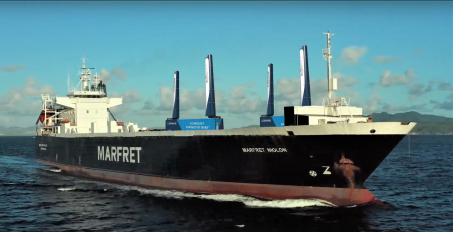
Marfret strengthens its commitment to corporate social responsibility (CSR) with the creation of two key positions dedicated to energy and ecological transitions: “Decarbonation Officer” and “CSR Project Manager.” These appointments mark a new step towards sustainable corporate governance, reflecting the growing importance of environmental issues at the core of Marfret’s strategy.
A familiar face within the company, Céline Douvenou left the reefer division of the MedCar line to pursue a Master’s in decarbonation, before taking up her new role as Decarbonation Officer on September 23. Together with Clothilde Lamare, CSR Project Manager, and under the direction of Véronique Passarelli, they form a team dedicated to reducing the company’s carbon footprint.
“We have joined the Convention of Enterprises for the Climate and are working on producing a decarbonation roadmap for the next five years,” explains Guillaume Vidil, Managing Director of Marfret. “I wanted to integrate these issues directly into the company’s governance, as they represent a significant financial investment and now require full-time roles.”
Marfret has set the goal of reducing its ships’ fuel consumption by 3 to 4% annually and aims to achieve Ecovadis certification.
The Decarbonation Roadmap
Marfret’s ambition extends beyond technological innovations. The company has set concrete goals for reducing its environmental footprint. Clothilde Lamare is responsible for collecting and analyzing greenhouse gas emissions data, both on land and at sea. “My role is to establish diagnostics, launch initiatives, and ensure rigorous follow-up,” she explains. Marfret’s carbon footprint assessment for 2022 and 2023 includes the analysis of direct emissions (scope 1), indirect energy consumption (scope 2), as well as emissions related to procurement (scope 3). This assessment has already shown a reduction of nearly 7% in CO2 emissions between these two years, thanks to the collective efforts of Marfret’s teams.
Marfret’s carbon footprint assessment for 2022 and 2023 includes the analysis of direct emissions (scope 1), indirect energy consumption (scope 2), as well as emissions related to procurement (scope 3). This assessment has already shown a reduction of nearly 7% in CO2 emissions between these two years, thanks to the collective efforts of Marfret’s teams.
A floating innovation lab: the Marfret Niolon
The Marfret Niolon is a key vessel in Marfret’s decarbonation strategy. Since 2020, this ship has been equipped with wind-assisted propulsion using aluminum eConowind turbo sails, allowing for a 10 to 15% speed increase.
The vessel also uses the EfficientShip software platform, developed by Syroco, optimizing routing gains by 14%. Other innovations, such as new hull-cleaning techniques, are currently being tested to maintain the ship’s optimal performance.
After its technical overhaul at Damen Shipyard in Dunkirk, the Marfret Niolon will return to sea with even more innovative systems to enhance its hydrodynamics and energy efficiency.